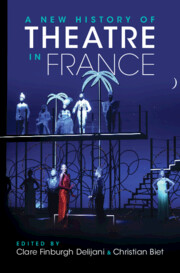Book contents
- A New History of Theatre in France
- A New History of Theatre in France
- Copyright page
- Dedication
- Contents
- Illustrations
- Contributors
- Acknowledgements
- Notes on the Text
- Introduction
- Chapter 1 The Performing Arts in Fifteenth- and Sixteenth-Century France
- Chapter 2 Drama during the Wars of Religion
- Chapter 3 Drama before Standardization
- Chapter 4 Neo-Classical Tragedy
- Chapter 5 Molière, a Man of the Stage?
- Chapter 6 Theatres as Economic Concerns
- Chapter 7 Seventeenth-Century Printed Theatre
- Chapter 8 Non-Official Eighteenth-Century Stages
- Chapter 9 The Expanded Theatre of the French Revolution
- Chapter 10 Nineteenth-Century Melodrama, Vaudeville and Entertainment
- Chapter 11 New Approaches to Women Actors and Celebrity in Nineteenth-Century France
- Chapter 12 Extended Romanticism in the Extended Nineteenth Century
- Chapter 13 Poetry in Action, 1945–1968
- Chapter 14 Performance and Installation Art
- Chapter 15 Twentieth- and Twenty-First-Century Theatre Directing
- Chapter 16 Political Theatre in France (1954–2020)
- Chapter 17 Liberating Third World Theatre
- Chapter 18 Francophone Theatre-Makers in France
- Chapter 19 Migration in Modern and Contemporary Playwriting
- Chapter 20 An Interview with Éric Ruf
- Chapter 21 An Interview with Magali Mougel
- Chapter 22 An Interview with Phia Ménard
- Bibliography
- Index
- References
Chapter 2 - Drama during the Wars of Religion
A Contextual Approach
Published online by Cambridge University Press: 22 October 2024
- A New History of Theatre in France
- A New History of Theatre in France
- Copyright page
- Dedication
- Contents
- Illustrations
- Contributors
- Acknowledgements
- Notes on the Text
- Introduction
- Chapter 1 The Performing Arts in Fifteenth- and Sixteenth-Century France
- Chapter 2 Drama during the Wars of Religion
- Chapter 3 Drama before Standardization
- Chapter 4 Neo-Classical Tragedy
- Chapter 5 Molière, a Man of the Stage?
- Chapter 6 Theatres as Economic Concerns
- Chapter 7 Seventeenth-Century Printed Theatre
- Chapter 8 Non-Official Eighteenth-Century Stages
- Chapter 9 The Expanded Theatre of the French Revolution
- Chapter 10 Nineteenth-Century Melodrama, Vaudeville and Entertainment
- Chapter 11 New Approaches to Women Actors and Celebrity in Nineteenth-Century France
- Chapter 12 Extended Romanticism in the Extended Nineteenth Century
- Chapter 13 Poetry in Action, 1945–1968
- Chapter 14 Performance and Installation Art
- Chapter 15 Twentieth- and Twenty-First-Century Theatre Directing
- Chapter 16 Political Theatre in France (1954–2020)
- Chapter 17 Liberating Third World Theatre
- Chapter 18 Francophone Theatre-Makers in France
- Chapter 19 Migration in Modern and Contemporary Playwriting
- Chapter 20 An Interview with Éric Ruf
- Chapter 21 An Interview with Magali Mougel
- Chapter 22 An Interview with Phia Ménard
- Bibliography
- Index
- References
Summary
This chapter challenges historiographical claims that the theatre created before the seventeenth century was a mere prelude to the symphony of the neoclassical age. French-language plays written between 1550 and 1600 under the aegis of the Pléiade poets, who were charged with renewing the French language by looking back to classical Greek and Roman writings, form the focus of their study. Despite their classical credentials, these plays are best understood not by categorizing them as ‘humanist’, but instead by ‘situating’ them within the history within which they were written: the denominational split brought about by the Protestant Reformation of Christianity in Europe, which provoked a seismic upheaval and called into question representation on social, political and even cosmological levels. Whether Protestant or Catholic, explicitly militant or seemingly apolitical, literal or analogical, these plays were inevitably affected by this crisis, otherwise known as the Wars of Religion. Bouteille and Karsenti conclude that by returning to classical antiquity, Renaissance playwrights sought as much to garland their work with greater prestige as to innovate devices capable of recounting their anguished, conflicted and traumatic world.
Keywords
- Type
- Chapter
- Information
- A New History of Theatre in France , pp. 55 - 71Publisher: Cambridge University PressPrint publication year: 2024

